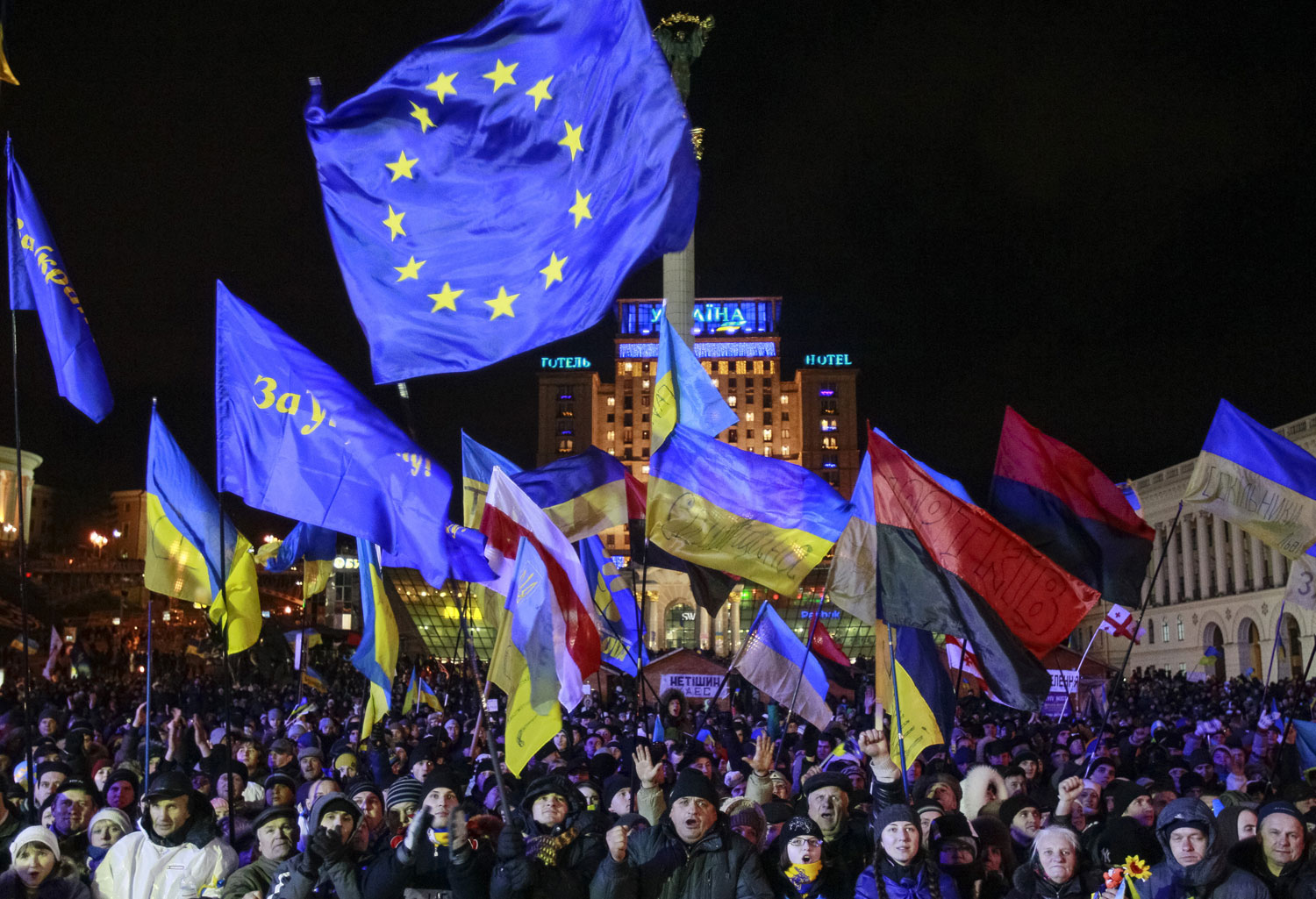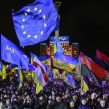
Ukraine—Strong People, Weak State (Part One): The Domestic Situation
Publication: Eurasia Daily Monitor Volume: 10 Issue: 217
By:

Recent developments in Ukraine have rapidly escalated into a political crisis after the authorities allowed special “Berkut” police units to crack down on protesters rallying in Kyiv’s Independence Square (“Maidan Nezalezhnosti”) before dawn on December 1, resulting in over a hundred people being injured. The protests, initially dubbed “Euromaidan,” were sparked by the government’s suspension of the Association Agreement process with the European Union. After the crackdown, however, the demonstrations took on the more articulate name of “Euro Revolution,” reflecting the underlying conflict between the incapable government, supported by several groups of “oligarchs,” and the public, which stands for change and is being led by Generation “Y” youth. The authorities’ response to the crisis suggests that the situation is unlikely to be resolved reasonably and efficiently by the current government in place, while the Russian authorities are utilizing Ukraine’s weakness to support Moscow’s own geopolitical competition with the West over the countries of the post-Soviet space.
The current events in Kyiv somewhat resemble the 2004 “Orange Revolution” (see EDM, December 2). A notable difference, however, is that it is the public and not the formal opposition political parties that are the driving force. These “non-partisan” protesters are efficiently using social media, are self-organizing and are even thinking strategically. As an example, the Maidan activists established a coordination “headquarters” that publishes strategy memos on a daily basis—a practice significantly less common with the opposition parties (https://www.shtabua.org/2013/12/i.html?utm_source=twitterfeed&utm_medium=twitter). They are also using an independent, crowd-funded Internet TV network (hromadske.tv), which gained popularity in Ukraine and offers live broadcasts of news and analysis.
Some Ukrainian public intellectuals and political experts argue that the Euro Revolution is being directed by the youth. Speaking at the Kyiv Post’s Tiger Conference on December 4 (attended by the author), historian Yaroslav Hrytsak commented that the Euro Revolution exemplifies a “generation gap” in Ukraine. The protests, he argued, are being driven not by the middle class, but rather well-educated and ambitious young people who are concerned with what they perceive as obstacles to their personal and career growth. Yet, it is the opposition parties (Batkivschyna, UDAR and Svoboda), though often criticized by unaffiliated protesters for their lack of leadership and political skills, that continue to enjoy the right and responsibility to use political instruments to resolve the crisis.
It appears that both President Viktor Yanukovych and the opposition have embarked upon the use of “siege” tactics. The president hopes that the protests will simply fizzle out—he demonstrates respect of the protesters and even support for their European aspirations and makes promises to resume the EU integration process as well as amend relations with Russia, including revising the natural gas price in the 2009 contract. Yanukovych also promised to make those guilty of the Euromaidan crackdown responsible. But in reality, the only “scapegoat”—who was not even fired, but only temporarily dismissed—was Kyiv’s police chief, who gave the order to disperse the protesters. The opposition in the parliament, meanwhile, failed to pass a vote of no confidence against Prime Minister Mykola Azarov’s government on December 3 (Interfax Ukraine December 3). According to the parliamentary rules, deputies in the Rada will not be able to initiate another no-confidence vote against Azarov until February next year (Kyiv Post, December 3). Nonetheless, Ukraine’s three former presidents (Leonid Kravchuk, Leonid Kuchma and Viktor Yushchenko) insisted in a joint statement on December 4 that the government had poorly prepared for the signing of the Association Agreement and it “caused a political escalation” (https://dt.ua/POLITICS/kravchuk-kuchma-i-yuschenko-zaklikali-vidnoviti-peregovori-z-yevrosoyuzom-133205_.html). Earlier reports erroneously stated that the letter called on the government to resign (https://www.segodnya.ua/politics/pnews/kravchuk-kuchma-i-yushchenko-pravitelstvo-dolzhno-uyti-v-otstavku-479729.html).
It is, of course, the government’s and, increasingly, the president’s poor performance record that caused the political crisis on Sunday, December 1, when media reported that the presidential chief of staff, Serhiy Lyovochkin, wished to resign—on December 2, he told Interfax-Ukraine that his resignation had not been accepted by the president and would probably be considered only after “a normalization of the situation in the country.” Furthermore, the Party of Regions’ parliamentary deputy Inna Bohoslovska left the party and criticized President Yanukovych for supporting Vladimir Putin’s scenario to split Ukraine (https://blogs.pravda.com.ua/authors/bogoslovska/5299ee5c0e09c/). On December 2, Bohoslovska said she was 100 percent confident that “at present Putin runs the show through [Viktor] Medvedchuk [Ukrainian politician and oligarch]” (https://www.pravda.com.ua/articles/2013/12/2/7004405/).
Blame for Ukraine’s pause in European integration and the ensuing political crisis in the country has also been directed at Prime Minister Azarov. The Ukrainian Policy Institute’s director, Kost Bondarenko, wrote in a blog post on December 1 that it was Azarov who pushed the Cabinet of Ministers to suspend the EU association process, while three ministers, including Minister of Finance Yuriy Kolobov, refused to sign this directive. Moreover, Bondarenko writes that it was Prime Minister Azarov who had persuaded President Yanukovych at the Vilnius Summit not to accept the EU’s additional macro assistance package, worth up to 3 billion euros ($4 billion), which had almost been agreed on. According to Bondarenko, Azarov argued that the European package was insufficient and that the Russian proposal was better, thus leading to President Yanukovych’s final decision not to sign the Association Agreement in Vilnius (https://blogs.pravda.com.ua/authors/bond/529b80b162c10/).
Protesters continue to block government buildings and the Presidential Administration offices in Kyiv. In fact, the combined pressure of the protesters, the parliamentary opposition and civil society may still result in Prime Minister Azarov’s resignation, which is perhaps the only, although already weak, option for President Yanukovych to save face. Batkivshchyna leader Arseniy Yatseniuk said the opposition’s demand now is early presidential and parliamentary elections (Interfax-Ukraine, December 3).




